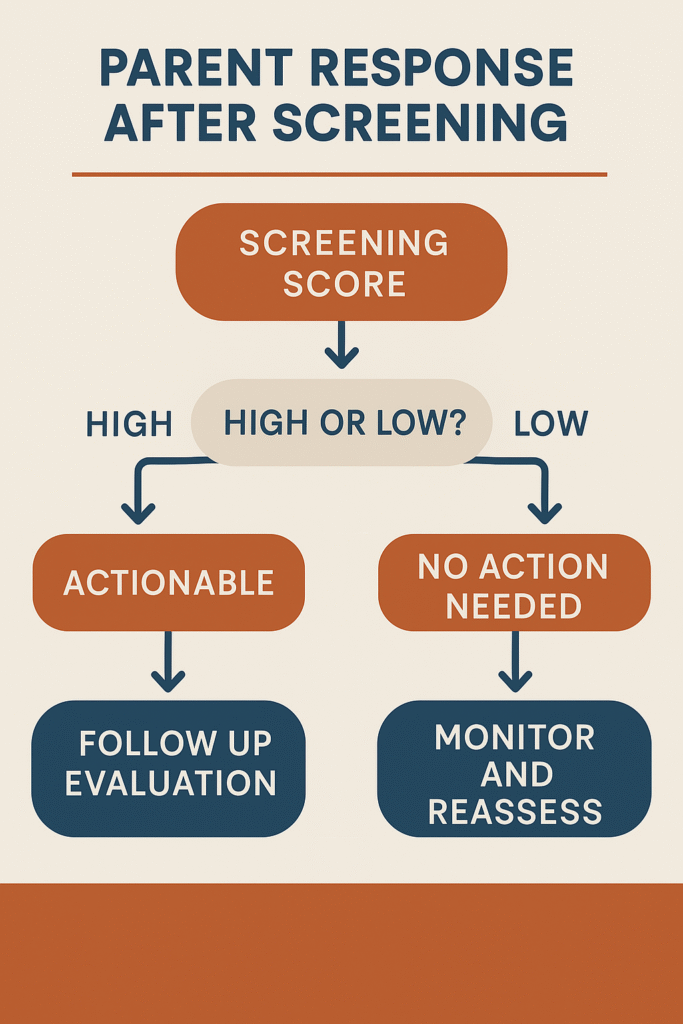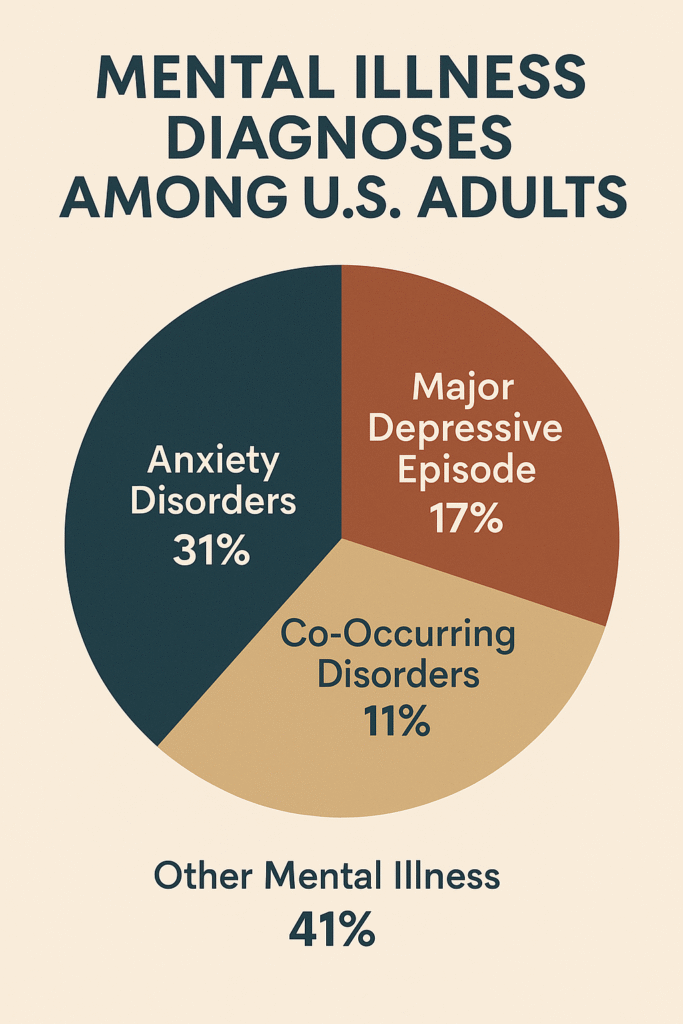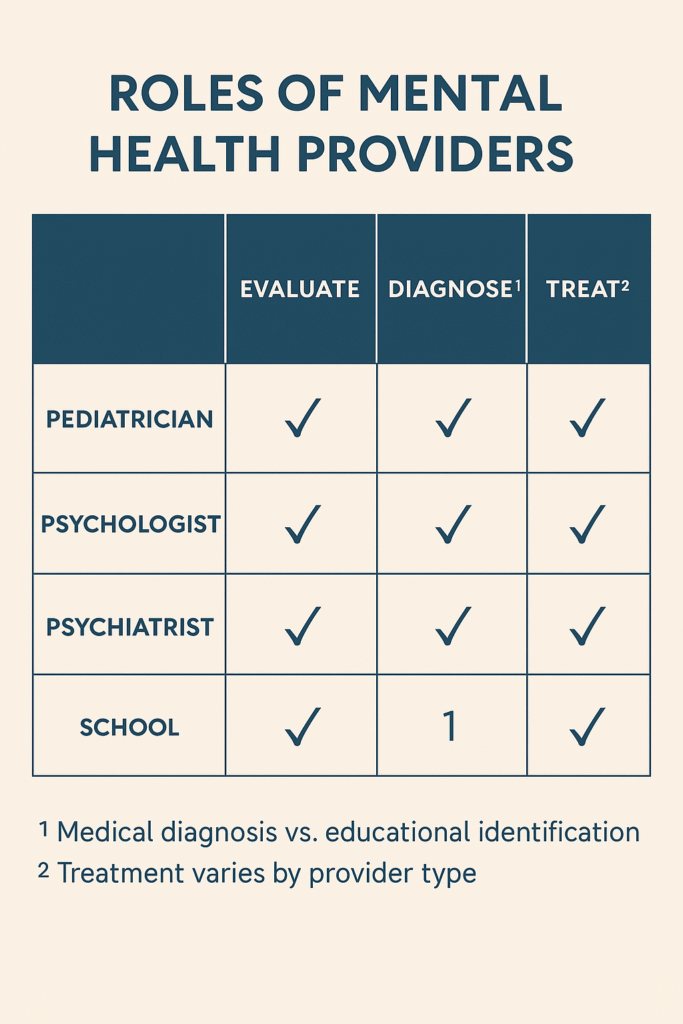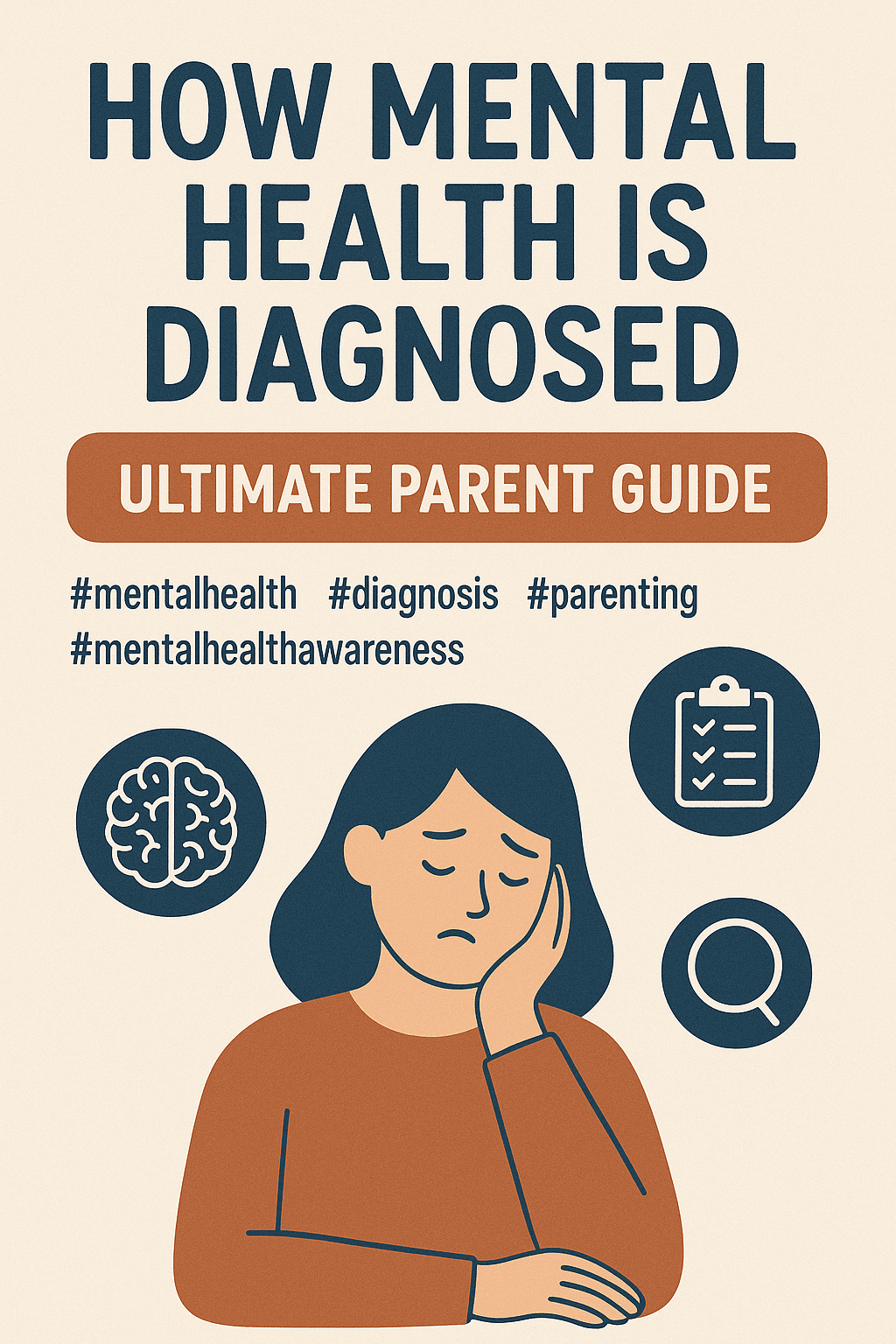How Mental Health is Diagnosed: Ultimate Parent Guide

Getting your child the right mental health support starts with understanding how mental health is diagnosed. The diagnostic process can feel overwhelming — but it doesn’t have to be mysterious or frightening.
I’ve walked this path with my own family, and I’ve learned that preparation makes all the difference. When you know what to expect, you can advocate better for your child and feel more confident navigating the system.
What Actually Happens During a Mental Health Assessment
🔍 The clinical interview forms the backbone of how mental health is diagnosed. This isn’t an interrogation — it’s a structured conversation designed to understand your child’s experiences, behaviors, and emotional patterns.
During the interview, the mental health professional will ask about symptoms, family history, school performance, and social relationships. They’re looking for patterns that align with specific diagnostic criteria from the DSM‑5‑TR (2022 Text Revision).
The assessment typically includes several components that work together to create a complete picture. These might include standardized questionnaires, behavioral observations, and sometimes cognitive testing. Each piece helps the clinician understand what’s really going on beneath the surface.
Initial intakes are commonly ~45–90 minutes, but a comprehensive child psychiatric evaluation usually takes a few hours over one or more visits. Some complex cases might require multiple sessions to gather enough information for an accurate diagnosis.
Different Types of Mental Health Evaluations
💡 Psychiatric evaluations and therapy intakes serve different purposes, though they often overlap. Understanding the distinction helps you know what to expect when you schedule that first appointment.
A psychiatric evaluation focuses heavily on diagnosis and medication management. The psychiatrist will assess symptoms, rule out medical causes, and determine if medication might be helpful. These appointments tend to be more medically focused and structured.
Therapy intakes, on the other hand, emphasize understanding your child’s emotional world and developing treatment goals. Therapists spend more time exploring relationships, coping strategies, and environmental factors that might be contributing to difficulties.
Some facilities offer comprehensive evaluations that combine both approaches. This can be incredibly helpful because it provides a complete assessment without requiring multiple appointments with different providers.
The DSM-5: Your Mental Health Diagnosis Roadmap
📌 The DSM‑5‑TR isn’t just a book — it’s the standardized system that ensures consistent mental health diagnosis across all providers. Think of it as the universal language that mental health professionals use to communicate about specific conditions.
Each disorder in the DSM‑5‑TR has specific criteria that must be met for diagnosis. For example, attention deficit hyperactivity disorder requires symptoms to be present in multiple settings and cause significant impairment in functioning.
The manual helps distinguish between normal developmental challenges and true mental health conditions. This is crucial because many behaviors that concern parents are actually typical for certain age groups.
Clinicians don’t just check boxes when using the DSM-5. They consider the full context of your child’s life, including cultural factors, family dynamics, and environmental stressors that might influence symptoms.
How Mental Health is Diagnosed: The Step-by-Step Process

✅ Understanding each phase of how mental health is diagnosed removes uncertainty and helps you prepare effectively for appointments.
➡️ Initial intake and history gathering – The provider collects detailed information about your child’s development, medical history, and current concerns
➡️ Clinical observation – Mental health professionals observe your child’s behavior, mood, and interaction patterns during the session
➡️ Standardized assessments – Questionnaires and rating scales provide objective data about symptom severity and functioning
➡️ Medical screening – Physical health factors that could influence mental health are identified and addressed
➡️ Diagnostic formulation – All information is synthesized to determine if criteria for specific conditions are met
➡️ Treatment planning – Evidence-based interventions are recommended based on the diagnosis and individual needs
Each step builds on the previous one, creating a comprehensive understanding of your child’s mental health needs. The process emphasizes accuracy over speed because getting the right diagnosis is crucial for effective treatment.
Preparing for Your First Mental Health Appointment
🧠 Preparation can transform a stressful appointment into a productive conversation that moves your family forward. Start by gathering relevant information about your child’s history, symptoms, and concerns.
Bring a list of current medications, including over-the-counter supplements. Mental health professionals need to know about everything your child takes because some medications can affect mood and behavior.
Document specific examples of concerning behaviors, including when they occur and what triggers them. Vague descriptions like “he’s always angry” aren’t as helpful as “he has explosive outbursts when asked to transition from preferred activities, usually lasting 10-15 minutes.”
Consider bringing your child’s report cards, teacher comments, or notes from other healthcare providers. These external perspectives provide valuable information about how symptoms manifest in different environments.
Key Questions Mental Health Professionals Will Ask
🎯 Understanding the types of questions you’ll encounter helps reduce anxiety and ensures you provide thorough, helpful responses. Most clinicians follow a similar pattern when determining how mental health is diagnosed.
Expect detailed questions about symptom onset, duration, and severity. The professional needs to understand whether difficulties are recent or longstanding, and how much they’re impacting your child’s daily functioning.
Family mental health history plays a crucial role in diagnosis because many conditions have genetic components. Be prepared to discuss mental health conditions in immediate family members, even if they were never formally diagnosed.
Questions about pregnancy, birth, and early development help rule out medical causes and identify potential risk factors. Don’t worry if you can’t remember every detail — provide what information you can.
The clinician will also ask about your child’s social relationships, academic performance, and behavioral patterns at home versus school. This helps them understand how symptoms manifest across different environments.
Medical Tests and Mental Health Diagnosis
🚨 While most mental health conditions are diagnosed through clinical interviews and behavioral assessments, medical testing sometimes plays an important role in how mental health is diagnosed. Physical health problems can sometimes mimic or contribute to mental health symptoms.
Blood tests might be ordered to check for thyroid problems, vitamin deficiencies, or other medical conditions that can affect mood and behavior. Numerous tests help ensure you’re being treated for the right problem. There is no standard lab or imaging test that diagnoses a mental disorder; labs primarily help rule out medical conditions.
Brain imaging is rarely used for routine mental health diagnosis, despite what you might see in popular media. CT scans and MRIs are typically reserved for cases where a brain injury or neurological condition is suspected. Brain imaging is not used for routine diagnosis; reserved for specific medical concerns.
Some conditions might require ongoing monitoring through blood tests if medication is prescribed. This ensures medication levels remain safe and effective throughout treatment.
Understanding Mental Health Assessment Tools
📋 Standardized assessment tools provide objective data that supplements the clinical interview when determining how mental health is diagnosed. These questionnaires and rating scales help quantify symptoms and track changes over time.
Common tools include the Child Behavior Checklist (CBCL), which gathers information from multiple sources about your child’s functioning. Teachers, parents, and sometimes the child themselves complete different versions.

Age-specific assessments ensure that evaluation methods match your child’s developmental level. A five-year-old and a fifteen-year-old require completely different approaches to assessment and diagnosis.
Many assessment tools have been validated across different cultural and ethnic groups, helping ensure accurate diagnosis regardless of your family’s background. However, cultural factors should always be considered when interpreting results.
The American Psychological Association provides guidelines for proper use of psychological tests in diagnosis. These standards ensure that assessments are administered and interpreted correctly.
The Mental Health Evaluation Process Timeline
⏰ The path from initial appointment to final diagnosis varies significantly depending on complexity and provider availability. Understanding how mental health is diagnosed includes knowing realistic timelines for the process.
Initial appointments focus on gathering information and ruling out immediate safety concerns. If your child is experiencing thoughts of self-harm, this takes priority over detailed diagnostic evaluation.
Follow-up appointments allow providers to observe how symptoms change over time and gather additional information. Sometimes initial impressions need to be revised as more data becomes available.
Don’t be surprised if the diagnosis evolves during treatment. Mental health conditions can be complex, and it sometimes takes time to understand the full picture of what’s happening with your child.

Timeframes vary widely; many evaluations require multiple visits over several weeks. School special‑education evaluations operate on legal timelines (often within 60 days of parental consent, state rules may differ).
After the Diagnosis: Next Steps and Treatment Planning
💪 Receiving a mental health diagnosis marks the beginning of your treatment journey, not the end of your search for answers. A good diagnosis opens doors to effective interventions and support services.

Your provider should explain the diagnosis in language you understand and answer questions about what it means for your child’s future. Don’t hesitate to ask for clarification or additional resources.
Treatment recommendations should be specific, evidence-based, and tailored to your child’s individual needs. Cookie-cutter approaches rarely work well in mental health treatment.
Consider seeking a second opinion if the diagnosis doesn’t feel right or if you have concerns about the evaluation process. Trust your parental instincts while remaining open to professional expertise.
Understanding how mental health is diagnosed also means knowing that treatment plans should be flexible and adjusted based on your child’s response to interventions.
Common Mental Health Diagnostic Challenges
🎯 Accurate mental health diagnosis can be complicated by several factors that parents should understand.

Co-occurring conditions are incredibly common, meaning your child might meet criteria for multiple diagnoses simultaneously.
Developmental factors can make diagnosis challenging in younger children. What looks like anxiety in a preschooler might actually be normal separation anxiety, while apparent defiance in a teenager could signal underlying depression.
Cultural and family factors influence how symptoms are expressed and interpreted. What one family considers problematic behavior might be completely normal in another cultural context.
Sometimes symptoms are related to environmental stressors rather than an underlying mental health condition. Trauma recovery strategies require different approaches than treating inherent mental health conditions.

Supporting Your Child Through the Diagnostic Process
❤️ Your attitude and approach significantly influence how your child experiences the mental health assessment process. Frame the appointment as getting help rather than finding out “what’s wrong” with them.
Explain the process in age-appropriate terms before the appointment. Younger children might benefit from knowing they’ll “talk to someone who helps kids feel better,” while teenagers can handle more detailed explanations about how mental health is diagnosed.
Validate your child’s feelings about the process while maintaining optimism about finding solutions. It’s normal for kids to feel nervous, embarrassed, or resistant to mental health evaluation.
Consider how you’ll discuss any diagnosis with your child. The way you frame mental health conditions shapes how your child sees themselves and their potential for growth and healing.
Many families find it helpful to normalize mental health care by comparing it to getting glasses for vision problems or treatment for other medical conditions.
Questions to Ask Your Mental Health Provider
💡 Being an informed advocate for your child means asking the right questions during and after the diagnostic process. Don’t be afraid to speak up if something doesn’t make sense about how mental health is diagnosed.
Ask about the provider’s experience with your child’s age group and specific concerns. Expertise matters, especially for complex conditions or younger children who require specialized approaches.
Request information about treatment options, expected timelines, and how progress will be measured. Understanding the path forward helps you support your child effectively and maintain realistic expectations.
Inquire about how the diagnosis might affect school accommodations, family routines, and long-term planning. Mental health conditions are just one part of your child’s identity, not a limitation on their potential.
Red Flags in Mental Health Evaluation
🚨 While most mental health professionals are competent and caring, knowing warning signs helps protect your family from inadequate care. Trust your instincts if something feels wrong during the evaluation process.
Be cautious of providers who seem to rush through how mental health is diagnosed without gathering comprehensive information. Accurate mental health diagnosis requires time and thorough assessment.
Watch for professionals who dismiss your concerns, refuse to answer questions, or seem judgmental about your family situation. You deserve respectful, collaborative care that honors your expertise about your own child.
Question any provider who guarantees quick fixes or promises that medication alone will solve all problems. Mental health treatment usually requires multiple approaches and ongoing effort.
The Role of School in Mental Health Assessment
📚 Educational environments provide crucial information for how mental health is diagnosed because they offer a different perspective on your child’s functioning. Teachers observe your child in structured settings with peer interaction.
School records, including report cards and behavioral incident reports, help document patterns over time. This historical information can be invaluable for understanding when difficulties began and how they’ve evolved.
Many schools have mental health professionals who can provide additional assessment data. School psychologists and counselors often conduct their own evaluations that complement outside mental health services. Schools conduct IDEA/504 evaluations to determine educational supports; medical diagnosis still comes from licensed health professionals.
Consider requesting a school-based evaluation if you haven’t already. Special education services might be available to support your child’s academic success while addressing mental health needs.
ADHD discipline strategies often require coordination between home and school to be most effective.
Insurance and Mental Health Diagnosis
💰 Understanding your insurance coverage helps you navigate the financial aspects of mental health care without unexpected surprises. Under the federal MHPAEA law, if a plan covers mental health/substance‑use benefits, those benefits cannot be more restrictive than medical/surgical coverage. (Parity ≠ mandatory coverage; it governs how covered benefits are treated.)
Call your insurance company before scheduling appointments to understand your benefits, copays, and any requirements for referrals or pre-authorization. This prevents billing surprises later.
Keep detailed records of all mental health services, including dates, providers, and services received. This documentation helps with insurance claims and tracking your child’s progress over time.
Ask providers about sliding scale fees or payment plans if insurance doesn’t cover all costs. Many professionals offer reduced rates for families facing financial hardship.
Specialized Assessments for Specific Conditions
🧩 Some mental health conditions require specialized evaluation approaches beyond standard diagnostic procedures. Understanding how mental health is diagnosed for specific conditions helps you know what to expect.
Autism spectrum disorders often require developmental assessments that look at communication, social interaction, and repetitive behaviors. These evaluations might include observation in natural settings and specialized rating scales.
Learning disabilities typically involve cognitive and academic testing to identify specific areas of difficulty. These assessments help distinguish between learning problems and behavioral issues.
Bipolar disorder in children requires careful evaluation to distinguish mood episodes from normal childhood emotional development.
Trauma-related conditions need assessments that consider the child’s exposure to adverse experiences and how these events have affected their development and functioning.
Building a Support Team
🤝 Effective mental health care often involves multiple professionals working together. Understanding how mental health is diagnosed includes knowing who might be involved in your child’s care team.
Your primary care physician should be kept informed about mental health treatment, especially if medications are involved. They can monitor for side effects and coordinate care.
School personnel, including teachers, counselors, and special education coordinators, play important roles in implementing accommodations and tracking progress in academic settings.

Family members and caregivers need education about the diagnosis and how to provide consistent support across different environments where your child spends time.
Consider connecting with other parents who have children with similar diagnoses. Support groups can provide practical advice and emotional support during challenging times.
Long-term Monitoring and Adjustment
📈 Mental health diagnosis isn’t a one-time event — it’s an ongoing process that evolves as your child grows and develops. Regular check-ins help ensure that treatment remains effective and appropriate.
Symptoms can change over time, especially during developmental transitions like puberty or major life changes. What works for a 7-year-old might need adjustment when they become a teenager.
Treatment goals should be reviewed and updated regularly based on your child’s progress and changing needs. This collaborative approach ensures that interventions remain relevant and effective.
Some children may develop additional mental health conditions over time, while others might see improvement that allows for reduced services. Flexibility is key to successful long-term management.
According to the Centers for Disease Control and Prevention, early identification and treatment of mental health conditions significantly improve long-term outcomes for children.
Getting a mental health diagnosis for your child can feel overwhelming, but remember that knowledge is power. Understanding how mental health is diagnosed helps you advocate effectively for your child and removes much of the mystery from the process.
The goal isn’t to label your child — it’s to understand their needs so you can provide the best possible support. With the right information and professional guidance, you can help your child develop the skills and strategies they need to thrive.
Your child’s mental health journey is unique, and there’s no single path that works for everyone. Stay patient with the process, celebrate small victories, and remember that seeking help demonstrates strength, not weakness.
The process of how mental health is diagnosed continues to evolve as our understanding of child development and mental health improves. Stay informed about new developments and treatment options that might benefit your family.
Explore More from Our Family of Blogs
Mountains Will Move
Faith-based encouragement for everyday families.
Everyday Exposed
No-filter truth hub for critical thinking and clarity.
Thank you for being part of the community. God Bless you and your family.
